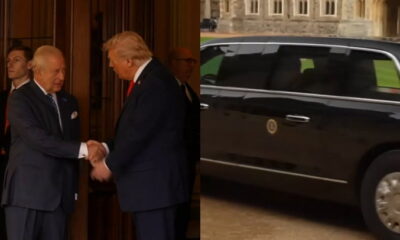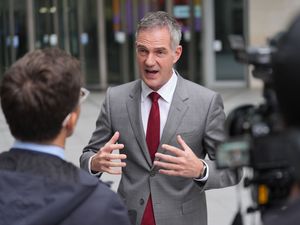Politics
Angela Rayner and Bridget Phillipson Face Credibility Debate

The discussion around political credibility has intensified following comments made by UK Labour Party politicians Angela Rayner and Bridget Phillipson. In a recent interview, Rayner expressed concerns about how she and Phillipson are perceived in terms of their working-class backgrounds, suggesting that their authenticity is being questioned amid political rivalries.
Rayner pointed out that while both she and Phillipson share similar roots, their experiences and narratives differ significantly. This has led to a public debate about the authenticity of their claims and the implications for their political careers. Rayner stated, “I can’t play the poor working-class card like other northerners,” highlighting her unique perspective on class and identity within the political landscape.
Authenticity in Politics
The issue of authenticity in politics is not new, but it has gained renewed attention in recent months. Politicians often navigate complex narratives about their backgrounds to connect with voters. Rayner’s comments shed light on the challenges faced by politicians from working-class backgrounds who must balance personal experiences with public expectations.
As both Rayner and Phillipson represent constituencies in the North of England, their remarks have sparked discussions about regional identity and the representation of working-class individuals in the Labour Party. Critics argue that the party must remain anchored to its roots to maintain voter trust, especially in light of recent electoral challenges.
Impact on Political Landscape
The Labour Party has faced difficulties in recent elections, with analysts noting a decline in support from traditional working-class voters. This backdrop makes the authenticity of leaders like Rayner and Phillipson even more critical. Their ability to resonate with constituents could influence the party’s strategy as it heads into upcoming elections.
Rayner’s candid acknowledgment of her situation reflects a broader sentiment about the representation of working-class individuals in politics. As debates about socioeconomic status and political identity continue, the Labour Party must consider how its leaders communicate their backgrounds and experiences.
In summary, the conversation initiated by Angela Rayner and Bridget Phillipson highlights a significant aspect of contemporary politics. As the Labour Party seeks to reclaim its status among working-class voters, questions of credibility and authenticity remain at the forefront. The ongoing discourse will likely shape the party’s direction in the coming months as it prepares for future challenges.
-

 World2 days ago
World2 days agoCoronation Street’s Shocking Murder Twist Reveals Family Secrets
-

 Entertainment4 months ago
Entertainment4 months agoKate Garraway Sells £2 Million Home Amid Financial Struggles
-

 Entertainment3 months ago
Entertainment3 months agoAnn Ming Reflects on ITV’s ‘I Fought the Law’ Drama
-

 Health3 months ago
Health3 months agoKatie Price Faces New Health Concerns After Cancer Symptoms Resurface
-

 Entertainment3 weeks ago
Entertainment3 weeks agoCoronation Street Fans React as Todd Faces Heartbreaking Choice
-

 World3 weeks ago
World3 weeks agoBailey Announces Heartbreaking Split from Rebecca After Reunion
-

 World5 days ago
World5 days agoKevin Sinfield Exceeds Fundraising Goal Ahead of Final Marathons
-

 Entertainment3 months ago
Entertainment3 months agoCoronation Street’s Carl Webster Faces Trouble with New Affairs
-

 Entertainment4 days ago
Entertainment4 days agoTwo Stars Evicted from I’m A Celebrity Just Days Before Finale
-

 Entertainment3 months ago
Entertainment3 months agoWhere is Tinder Swindler Simon Leviev? Latest Updates Revealed
-

 Entertainment4 months ago
Entertainment4 months agoMarkiplier Addresses AI Controversy During Livestream Response
-

 Science2 months ago
Science2 months agoBrian Cox Addresses Claims of Alien Probe in 3I/ATLAS Discovery




















